The Prodigal Son, Warriors Two (1978, 1981)
Directed by: Sammo Hung
Written by: Barry Wong, On Szeto, Sammo Hung
Starring: Bryan Leung, Casanova Wong, Frankie Chan, Lam Ching-Ying, Sammo Hung, Yuen Biao
AVAILABLE ON BLU-RAY: NOW, from EUREKA ENTERTAINMENT
Eureka Entertainment follow up their fabulous Three Films With Sammo Hung release which consisted of The Iron Fisted Monk, The Magnificent Butcher and Eastern Condors. I’d seen both of the two films included here, but not for some time. They both centre around Wing Chun, the martial art probably best known for being practised by Bruce Lee as being taught to him by Yip Man. The first film is actually a sequel to the second, with the youthful, arrrogant rich kid of the second a stern humourless middle-aged master in the second. One could watch the second first, but I opted for viewing them in the order in which they were made.
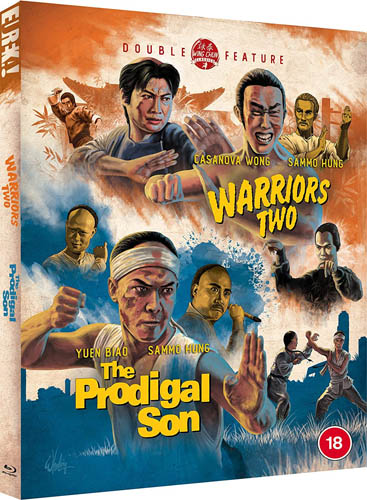
DISC ONE – WARRIORS TWO [1978]
AKA ZAN XIAN SHENG YU ZHAO GIAN HUAZ, MR TSANG AND CASHIER HUA
RUNNING TIME: 95 mins/90 mins
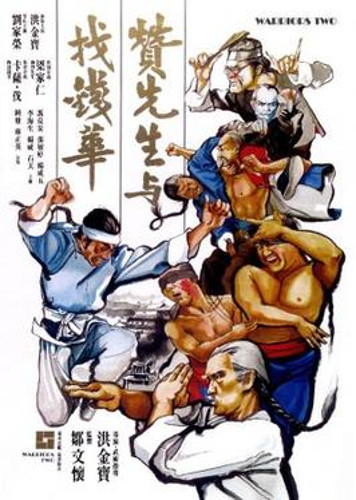
One day, while working late on the job, bank teller Chan Hua discovers that his villainous boss, Mo, is plotting to kill the town’s chief and take power for himself. When he makes the mistake of telling Mo’s devious henchman Chiu about the plot, Hua ends up beaten within an inch of his life. He takes refuge at his friend Fei Chun’s house, but Mo and his helpers are determined to force him out into the open and are willing to murder his mother, not to mention the town mayor, to do so. It seems that Chun will need the support of humorless kung-fu master Leung Tsen, who specializes in Wing Chun, but Tsen is reluctant to take him on because in his opinion martial arts should be not learned primarily with revenge in mind….
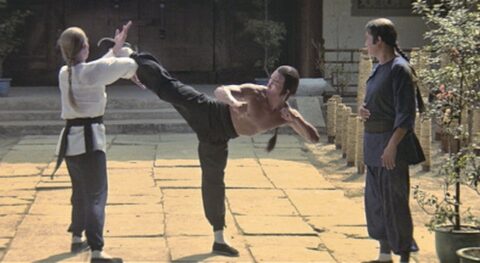
Well this one was certainly as good as I remembered. In fact it may have been better. Magnificent Butcher was an absolutely cracking film, but it did have many changes in tone and even style which for some probably jar. For me personally, that wasn’t an issue, I really enjoyed the surprises and even unpredictability that resulted from this, though can see why others would just see it as Hung being very undisciplined and trying to cram in as much stuff as he could. But with Warriors Two, we see a refining accompanied by a greater understanding of film technique. Gone are the plot diversions except for some moments of humour, to be replaced by a story that’s straight forward but still involving despite only offering variations on familiar scenarios and situations that we’ve seen time and time again in the genre. In fact the whole film comes across as Hung’s tribute to Shaw Brothers; the style is almost exactly replicated here with just a little bit more sophistication in the camerawork. Even the character archetypes are very Shaw Brothers. But Hung brings in comedy and intergrates than he did before, even getting away with using it at odd times. And there’s further advancement made in what we want to see most – fight sequences. There’s even more smoothness and intensity than we saw before, along with a greater emphasis on accuracy of technique which wasn’t something that became a Hung trademark but which is nice to see here. The brawls are simply amazing to watch and even they incorporate comedic bits extremely smoothly; we can have a chuckle but the seriousness and urgency remains. Add some truly terrific training sequences and you really do have a bona fide genre classic.
We open with a really great shot of a person practising kung fu in a foggy glade in the middle of a forest. Of course it’s a set, but a nicely atmospheric one of the kind you often get in Shaw Brothers productions. Assembly line products their films may have been, but their house style, at least in their martial arts films, had distinctive aesthetics. A narrator tells us of the introduction of Wing Chun, except in the English dub it’s called Yung Chun – and yes it was the English dub I listened to in full. Regular readers will know of my liking for these dubs which I make no apology for. The person we see doing these moves is Leung Tsen, who actually existed; his association with Wing Chun can be considered as the equivalent of Wong Fei-hung’s association with the Hung Gar style, even if Fei-Hung is far better known. We watch him for a while before cutting to Chan Hua busting his own moves in front of a waterfall. The way the narrator introduces these two characters is unusual, and when the title of the film comes up it’s in the middle of both characters freeze framed jumping into the air which is especially cool. The two are seen to spar, though it’s probably not really happening, it’s more like the equivalent of the many openings where the main star shows his dexterity in a variety of forms. Then we meet Fei Chun trying to sell dumplings on the street. The most substantial of the bits cut from the International Version is here, with Fei Chun tricked into having his dumpling table taken away by being challenged to a display of prowess, namely the Two Character Goat Clamping Stance. The other three portions are tiny and not worthy of note, though the bit of the training sequence but involved a verbal joke that would be difficult to translate into English.
Fighting is held off for a while. A few brief blows are exchanged when it seems like we’re going to get the typical fight in an inn. Leung Tsen and his niece have trouble with some thugs over a table, but nothing major takes place. Said thugs are employed by the villainous and greedy Mo whose first victims that we see are the town head and his servant. Then it’s Hua’s mother, an event that we don’t even see and which is covered in a few shots, a good example of the tight economy that exists in this film; scenes are brisk and to the point. Chan Wah nearly gets it himself, but is carried off by Chun to safety. As he recovers he wants Tsen to teach him, but he doesn’t want to, leading to a quite fine comedic scene where Chun pretends he’s teaching Wah the “Topless Style Vertical Horse in the Nose Back” [yes that’s what the dub calls it], and says to Wah, “Tuck your backside in….it prevents you from getting the piles”. Unsurprisingly this gets Tsen to commence teaching Wah and boy is this section good, with strength and mastery of style certainly not being the only things that need to me mastered. We have Wing Chun dummies which slide along the ground [not far off from the Wooden Men then], Wah having to smash nuts thrown to the floor with a staff, and a refresh of information about those pressure points, with the feet here being the weakest parts of the body. You just know you’re going to get a brutal bit of foot smashing later on. And you also know what the rest of the story is going to basically be, though we get an amusing surprise when Hua, Chun and Chun’s daughter [I didn’t get her name] split up to use specific Wing Chun styles against Mo’s leading fighters and it becomes apparent that Chun mixed up the fighter’s names [the dolt] and our three have to improvise.
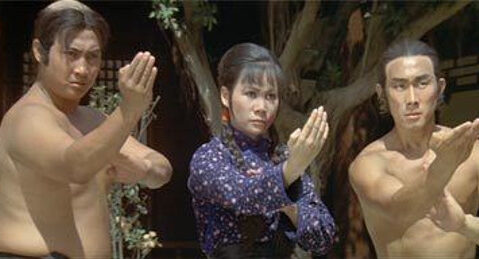
The fights, mostly but certainly not all weaponless, are intricate and graceful, and, while we get the expected wire and trampoline work, they still seem a little more realistic than was usual for the time, at least until the climax where one character basically transforms and – well, you have to see it for yourself, but look forward to a both hilarious and lethal Praying Mantis Style that should have any martial arts fan cheering, as well as a twist that’s bafflingly pointless yet slightly scary. The first major fight scene is when Hua is attacked by Mo’s men who take turns, either in small groups or individually. Hua does his best but clearly isn’t up to the task and we feel for him as he gets more and more beaten down. Then there’s a good bit when the Major is attacked. He has a pretty good aide who’s played by the legend that is Lau Kar Wing, so he obviously does pretty well though is still defeated and finally polished off by a kick from Thunder Pai. After a false start near the beginning of the film, we eventually get our inn battle with Tsen having to fight off Mo’s lot, some of the time with his foot in a bear trap, in a very intense encounter where the dastardly bad guys use ever more devious means to try to win. It’s easy to forget the Bryan Leung had no martial arts training; he relied on mimicking moves by others and here manages to projects the idea that he’s a very skilled fighter. After a mass battle at the school and one of those silly scenes where the villains don’t check whether somebody is dead, we get our climactic set-tos which really are a marvel to behold. One takes place in a forest at night and has a horror vibe. Of course we know that Hung, at the height of his form, and Wong are extremely skilled, but Cheung Man-tin who’s also on their side does hold her own despite, like Leung, knowing little martial arts. Why she isn’t credited is both an insult and a mystery.
There are some very vicious moments with lots of that distinctive Shaw Brothers-style blood on offer, some of them also amusing as well, like when Hua punches some of an opponent’s pressure points. The latter is soon covered in purple polka-dots before Hua destroys him with a very painful looking death-kick to the balls. A cut then reveals to us how Chan managed to achieve this nut-cracking devastation; by practising on a pear! Unfortunately the scene where he’s told by Chung about his mother’s death lacks the dramatic impact is should; it’s hard to tell if it’s being played seriously or for laughs. I should also mention some very poor makeup. Familiar bad guy Fong Hark-on is saddled with what looks like modelling clay on his forehead to presumably make us think that he’s old even though the rest of his face hasn’t been touched despite the usual gray false wig and moustache, while Hung has to wear an awful looking bald cap which he sometimes scratches. Tiger Yang as Thunder Pai both looks and acts like Hwang Jang Lee and is no slouch in the kicking department himself. Dean Shek has one of his more memorable weasly villain parts who even gets to fight Hung in an outstanbiing example of comedy kung fu, even though his main technique is to head butt his opponent because he wears a metal cap. While Hung’s direction is generally of the Shaw approach, there are some neat edits and high angles of some fight moments. And the music score, credited as usual to Frankie Chan though the credit should have been “music compiled by” rather than “music by”, uses a large selection of tracks of different moods. A nice western-style theme accompanies some of the training. The only pilfered bits that I noticed were two excerpts from John Barry’s King Rat score. Warriors Two is a genuinely masterful dose of kung fu cinema which belongs in any genre fan’s collection.
SPECIAL FEATURES
Limited Edition Set – 3000 copies
Limited Edition O-Card slipcase featuring new artwork by Darren Wheeling
Limited Edition reversible poster featuring original Hong Kong artwork
A Limited Edition collector’s booklet illustrated with rare archival imagery and featuring new writing by James Oliver; a reprint of Frank Djeng’s original liner notes for The Prodigal Son from the US laserdisc release; and reprints of Warriors Two’s original sales notes and theatrical flyer
SPECIAL FEATURES
Warriors Two: Hong Kong Theatrical Version [95 mins]
This must be one of the best restorations yet of one of these films. The print is almost flawless and the colours are rich. Image density is very strong and the level of grain is very even. There’s quite a variety of cinematographic styles here and the print handles each one very well indeed.
Warriors Two: International Export Version [90 mins]
Original Cantonese mono audio [Hong Kong Version]
Optional English dubbed audio (Hong Kong and Export Versions) [Note: English audio was originally created for the shorter export version, when playing English audio on Hong Kong version, some scenes will still be Cantonese w/ subtitles]
As I mentioned earlier, I opted to watch the Hong Kong Version with the English audio. That way I got to see most of the film the way I preferred, but was also able to note the bits cut from the Export Version which I also noted earlier.
Optional English Subtitles, newly translated for this release
Brand new feature length audio commentary by Asian film expert Frank Djeng (NY Asian Film Festival) and martial artist / actor Robert “Bobby” Samuels [Hong Kong Version]
For once Hong Kong movie audio commentary stalwart Frank Djeng is joined by another, and the result is one of the best tracks I’ve heard in a while. His companion Bobby Samuels worked on many Hong Kong films in the ’90s including some for Hung, and was the first African-American to do so. The early part of the track does largely consist of Djeng asking Samuels about his experiences, but they’re great to hear, be it Samuels entering a restaurant and having it pointed out to him the table where Lau Kar-wing and his brother Lau Kar-leung would often sit, being given a book put together by Lee Hoi Sang’s family after his death which only a select few were given, or sitting in with John Woo as he edited A Better Tomorrow. The track does become more scene specific though not all the time, achieving a good balance. Samuels is also an expert in Wing Chun and says that this film is the best Wing Chun movie. Of course Djeng offers much of interest himself. The two have a good rapport in just their first track.
Brand new feature length audio commentary by action cinema experts Mike Leeder & Arne Venema [Export Version]
Of course Leeder and Venema bring a lighter approach, introducing things, as usual, by singing the notes of the Golden Harvest logo music. The two are heavier on the actual film than the two above, though still add a lot of personal stories, if not all related to the film at hand, from frames from the original print of Drunken Tai-Chi missing because they were snipped out to be used as promotional stills, to a funny encounter between Lau Kar-Leung and Rizza from the Wu-Tang Clan, beginning with Rizza telling him he was reason he studied martial arts and Lau replying “I don’t know any kung fu, I fake it“. If there’s one flaw in the always highly entertaining tracks from this too-some, it’s that Leeder tends to interrupt Venema a bit, though he hardly does it here. Venema prefers this to The Prodigal Son which he thinks digresses a bit too much.
The Way Of The Warrior: Making of “Warriors Two” featurette [47 mins]
Hung, Wong, Leung, Hark-on and Wing Chin instructor Guy Lai reminisce in this Hong Kong Legends-produced piece which concentrates most on the martial arts side of things. Wong says how the final scene took two months to shoot, Hark-On tells of how Wong kicked him in the neck and he couldn’t breathe, Lai says how Wing Chun was for ages more of a rich person’s martial art because it was passed down from person to person and teachers had to be supported, and Hung mentions how he tried to bring in some philosophy. Surprisingly Bey Logan also appears, introducing bits and even performing some moves. For some time he hasn’t been allowed to be seen or heard on these releases because of some sordid accusations. We get that techno beat and wailing synthesised voice on loop in the background that for some reason accompanied Hong Kong Legends pieces for a while. But this is definitely great stuff.
Stills Gallery
Hong Kong Theatrical Trailer [4 mins]
International Trailer [3 mins]
DISC TWO – THE PRODIGAL SON [1981]
AKA BAAI GA JAI
RUNNING TIME: 100 mins
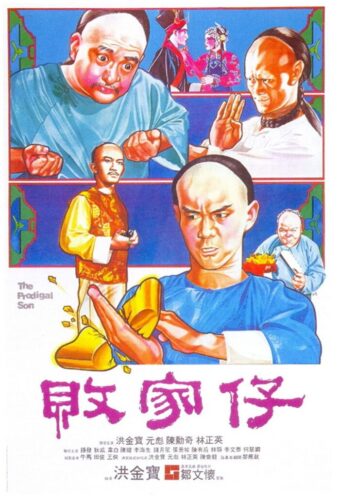
Leung Tsen is half-heartedly studying kung fu. He thinks he’s a great fighter. but he’s not, his father having arranged for his servant Yee Tung-choi to bribe his son’s opponents to lose to him in order to protect him, and in reality he’s not much good at all. Everyone knows this but him, giving him the nickname “The Prodigal Son” behind his back because of the money he’s costing his parents. When a woman fancied by one of Tsen’s friends turns out to be a Wing Chun master, Leung Yee-tai, who refuses to be bribed and defeats Chang, a dejected Tsen tries to get a reluctant Yee-tai to teach him Wing Chun. This may come in handy seeing as martial arts master Lord Ngai Fei is hunting for a worthy opponent. He’s also a “prodigal son”; his father having ordered his bodyguards to kill anyone who might beat him in a fight….
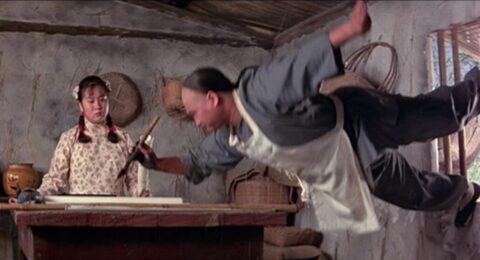
Well we really do have a great pair here. No, I’m not being smutty, I’m referring to the fact that both of the films in this set are among the best offerings from their genre of their period. Perhaps of any period. The action in these films is breathtaking, but plot and characterisation ain’t half bad too. Those two things may not usually priority, but it’s always nice when good attempts are made with those things. The Prodigal Son still retains the elements you expect and love, but its story tries some new things, most notably concerning its villain who’s really quite interesting. While his father is clearly bad, his own motives seem to be entirely honourable. All he really wants to do is to prove himself a competent fighter, something he rarely gets to do because of his darn father. He’s not dissimilar from our hero who’s in a similar situation, one that’s quite a hard role to play for someone like Yuen Biao, a skilled fighter who has to pretend he’s not a skilled fighter pretending that he is one. But Baio comes through in a complex fighting performance that also allows him to show his underappreciated acting chops. With even more comedy, something accentuated in the dubbed version with some really goofy voices, there’s a bit less fighting here, and when it comes it’s less flashier than we saw in Warriors Two, but it’s also more realistic in its depiction of Wing Chun, Hung trying to keep his fight scenes grounded and believable with very little of the usual leaping into the air and none of those really exaggerated moves that probably couldn’t be performed by a real person and are usually put together in the editing suite. After all, Wing Chun is basically about simple movements largely based on reflex. That’s not to say though that the fights aren’t thrilling to watch. Far from it!
This time the titles unusually take place over a sketch of Foshan, the town in which all the film is set, then the narrator tells us that the place is famous for three things; paper, a Buddha, and Mr. Tsen. You will recall in my introduction that the events here take place way before the events in Warriors Two, and it’s perhaps difficult to reconcile that film’s Tsen with the arrogant little man here who’s not even much of a fighter. He’s first seen in an inn where a confrontation brews and we eventually realise that it takes place upstairs when somebody jumps off the edge to land standing up on a table, do a somersault and then crash into another table. There’s one cut that shows that it wasn’t all done by one person, and it does perhaps suggest that we’re watching a somewhat different film to the one we actually are seeing as there isn’t much else like this to follow. Tsen beats his opponent and his opponent’s aides far too easily, but is of course too arrogant and deluded to wonder if it was all genuine. One of his friends is rather pushy with a lady he fancies, only it’s not a lady, it’s a man, though for some reason the dub gives Lam Ching Ying’s character a gay sounding voice except while in opera costume, which may seem like a shame seeing as this was his first major role [he had a tiny one in Warriors Two] and it’s one that develops some pathos. Mind you, the English track is crammed with goofy voices, though you can’t really say that this is out of place in a film that, despite its seeming aim to provide the definitive showcase for Wing Chun, asks us to laugh at two people with large moles and two other people with red noses. There’s a wonderful bit that conjures up visions of the full-on martial arts musical of our dreams that the English dubbers didn’t bother with though thankfully Eureka have added some, where Tsen and Yee-tai fight and sing taunts to each other while a group of musicians backs up the words.
Tsen is full of shame and even asks his friend to attack him at any time like Kato out of the Pink Panther films. He becomes obsessed with getting Yee-tai to teach him, but Yee-tai is asthmatic and tries anything he can to put him off, even casting him as a person who can be beaten up in the opera he’s starring in. A rich father comes in handy when he’s able to buy the ship that they’re on and make sure that Tsen is Yee-tai’s aide. It’s all pretty lighthearted despite the themes of shame and fakery until we get one of those typical Hung film sudden shifts in tone, as a bunch of ninjas sneak into Yee-tai’s school at night and slit nearly everyone’s throats. Moodily lit and pretty graphic, it even has a bit of humour where one person is dreaming about a person with a sword looming over him and wakes up to see the very same thing, perhaps the ultimate example of Hung’s liking for adding a chuckle at what seems like the most inappropriate time. After this things progress in a fairly expected manner. Yee-tai takes Tsen to the home of his friend Wong Wah-bo who performs possibly the film’s best comedic scene which is quite wonderful and which equals anything that Jackie Chan did. The Wong Fei-Hung theme comes on then dies out as he prepares to do some calligraphy, but isn’t used to doing something that isn’t fighting. As his portly daughter Twiggy watches, Wah-bo tears his paper, holds his brush the wrong way but eventually manages to write and draw a picture of himself while performing elaborate moves, even hanging from the ceiling. Hung’s gracefulness is an utter marvel considering his weight. After this it becomes all about training for a while, though this is kept credible, even low key considering the things we’ve seen in previous training sections, focusing on intense sparring and theoretical lectures despite there being two teachers. After all, Wing Chun involves no messing about, it’s to the point and even emphasises creating and focusing on the wounds of one’s opponents.
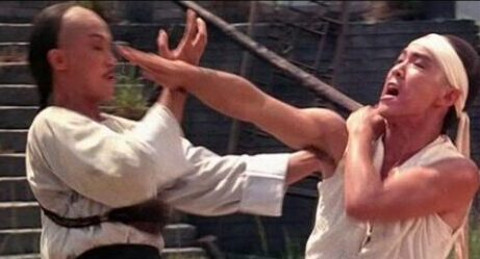
Warriors Two emphasises story for a bit before bringing in and gradually increasing the fight factor. This film has more action near the beginning then is happy to slow it down a bit in the second half. Baio is tremendous at pretending to be rubbish at fighting in his early confrontations; Jackie Chan would often do this in a highly elaborate and comedic way that was undoubtedly brilliant to watch, but Baio’s method of doing it in a simpler, straightforward fashion is also worthy of note. But then I’ve always found him to also be the most subtle actor out of Chan, Hung and Baio, even though he never attained major stardom. This may be because he lacked the onscreen charisma of the other two, but that didn’t stop others from becoming popular whom you wouldn’t necessarily expect. The brief confrontation between Tsen and Yee-tai also reminds that Ching-Ying wasn’t a trained martial artist which perhaps makes it just as well that he wasn’t given a fight with Baio in proper form later. A mass brawl backstage where people eventually spill onto a stage is very cool even if it doesn’t quite develop in the way it might have done, but Frankie Chan’s Ngai gets to defeat James Tien in a brief, brutal nocturnal encounter, then familiar Jackie Chan opponent Dick Wei, then have a superb if short encounter with Yee-tai on a bridge. Of course when a whole set is obviously burned down the actors are clearly right there. Then there’s a quite distressing scene when supposedly our main guy has others kill his opponent for him. Frankie Chan doesn’t quite evoke his character’s sense of shame enough, and we wish that the script by Hung and Barry Wong had explored this aspect further, but nonetheless the finale evokes unusual emotions. This is not just because of its vicious headbutt [more realistic looking blood here, none of that Shaw-like stuff], its comparatively short duration, and the fact that Baio sometimes doubles Frankie Chan, therefore fighting himself. It’s also because we actually feel sorry for Ngai and aren’t enjoying the sight of Tsen beating the crap out of him that much.
The names of cast members come up at odd times, not usually their first appearance, while multiple voiceovers and foreshadowing, things we had in the previous film, are employed more here. There’s a bit more use of close-ups, though only to accentuate moments, and more precise framing within shots. With each of his early films, one can chart Hung’s progress as a director. He would peak in the second half of the ’80s before lapsing a bit and never reaching his earlier form. The humour encompasses a speech bubble, Ching Ying painting over an attacker’s face as a clown, speeding up that we’re told is actually a swear word and, in the English dub, beauties like: “He’s handsome”. “Me too”. “He has the clap” “Me too”. Unfortunately the one female role is very small and it’s obvious that she won’t have any romance with Tsen as soon as we realise that she’s quite chubby. Chan also did the music which seems to be an actual score rather than a compilation of tracks from music libraries with a few bits pilfered from American or British film scores. It backs up the emotion and the drama fairly well though there aren’t any notable tracks. The Prodigal Son is another genre classic from a time that was full of them, a time that was a fascinating transitional period between the classical martial arts period pieces that came before and the more frenetic, inventive and often modern-set actioners that came afterwards, which thereby often resulted in us being given the best of both worlds.
If anything, this film looks even better than Warriors Two. They’ve totally nailed how to do this. The days of yellow tinges and spotty blacks are almost forgotten. I’m not saying much because quite frankly I don’t need to. Taken in context, the 2k restoration is almost flawless.
Original Cantonese mono audio
Optional English dubbed audio
Optional English Subtitles, newly translated for this release
Brand new feature length audio commentary by Asian film expert Frank Djeng (NY Asian Film Festival) and martial artist / actor Robert “Bobby” Samuels
The duo’s second commentary sees them really sinking into doing this, and at the end I was thrilled to learn that they’re be back for Eureka’s next two genre releases. Samuels knows his stuff as much as Djeng and points out the exact set from The Victim being reused and that those strange balls which Ngai messes about with before a fight are not a goofy gimmick but an actual device to improve dexterity, while mentioning how he found unseen footage from Enter The Dragon in Hung’s video collection when he lived with him [Sammo, if you’re reading this, please release it]. Of course Djeng still provides his usual and often scene-specific backing and some interesting facts such as the supposed Peking Opera in the film being sung inaccurately in Cantonese. Not an uninteresting moment; even biographies are kept to a minimum.
Brand new feature length audio commentary by action cinema experts Mike Leeder & Arne Venema
Leeder and Venema really have some serious competition here with the above duo, but come through with another typically lively yet informative chat that even gives us an interesting fact about The Dark Knight; the British stuntmen recused to jump into Hong Kong Harbour because of all the diseases they might catch from the fifthy water. We also learn that Baio did a backflip the first day he was put into his opera school as a small child [I’m not actually that surprised], and that Frankie Chan claims he directed all of Operation Condor. Not everything is specific to this movie, but there’s a great deal of appreciation of it nonetheless.
Wing Chun 101 with Sifu Alex Richter and Frank Djeng [30 mins]
Not officially listed as a special feature so obviously produced late in the day, this is an absolute treat for anybody interested in martial arts, and we also get to see what Djeng, taking a break from talking over movies, looks like too as he’s shown around Richter’s Manhattan Wing Chin school which is a mixture of the old and the new. It also contains one of the last surviving Wing Chun dummies of the Yip Man design and one that’s just like the one used in the film. Richter also tells of how seeing martial arts movies made him want to become a martial artist; his story of meeting Hung at age 16 is lovely. And then he not only demonstrates some moves, but also gets Djeng to join in.
The Heroic Trio – Archival interview with Sammo Hung, Yuen Biao, and Frankie Chan [28 mins]
Though not quite as detailed as the Hong Kong Legends piece about Warriors Two, this is still full of interest. Baio tends to have the most interesting things to say, partly because he doubled for many cast members and even explains how he was able to fight himself for some moves in the climax! Hung, who speaks the least [he always seems slightly guarded to me] emphasises how he wanted to incorporate philosophy and even ends with with some simple but undeniably truthful advice, while Chan tells us that some stuntmen were injured in the fire. I guess it’s a shame that the three weren’t actually together, and there’s a bit where Hung is obviously in another interview, but we’re thankful that Hong Kong Legends produced such good featurettes which can be used.
Life Imitating Art with Guy Lai [29 mins]
Wing Chun advisor Lai goes into detail about how Wing Chun is not really something designed for films as there’s lots of short moves, but how he managed to put it on screen with some exaggeration. He also tells of how he knew Lee as a kid and that Lee was always getting into fights. Not being an actual martial arts practitioner, I tend to get lost when I’m being told in depth technical stuff, but here my attention was kept.
Alternate English credits [1 min]
Hong Kong Theatrical Trailer [4 mins]
International Trailer [2 mins]
U.S. Home Video Trailer [1 mins]
These two films represent the peak that the martial arts genre was sometimes able to attain. If you want to get your other half into appreciating this kind of film, this set might be the one to do it. Add lots of good special features, including a whopping four audio commentaries which are all of very high quality, and we have a release that I have to say is Highly Recommended.





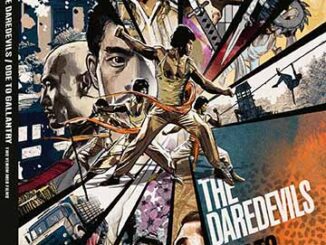
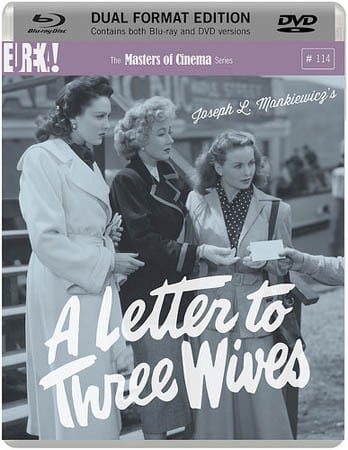
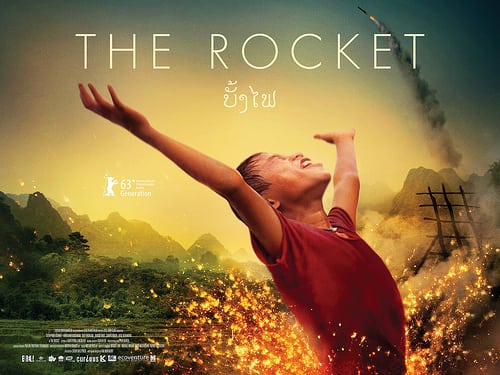
Be the first to comment